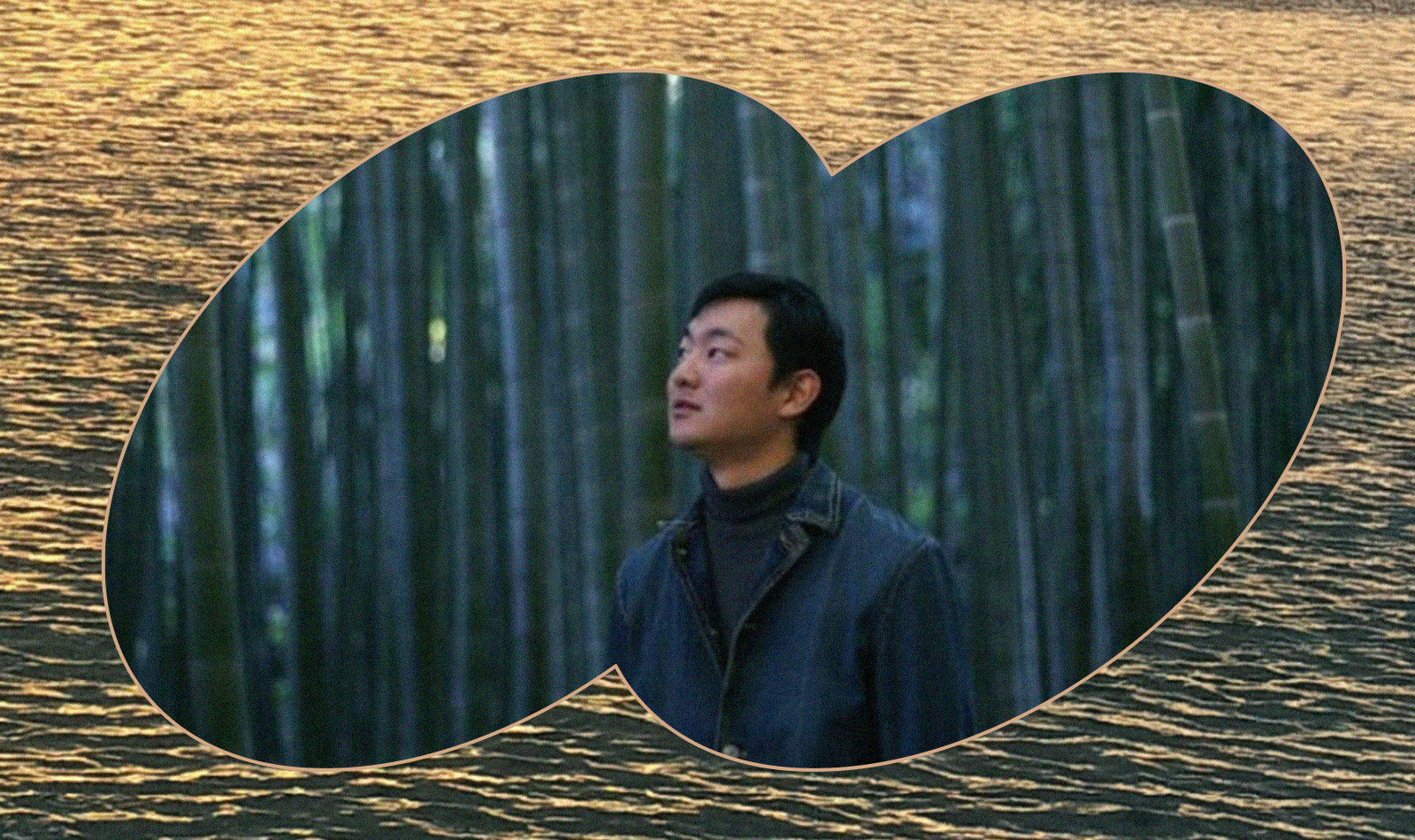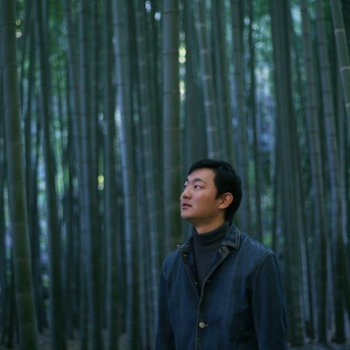
Few artists release more music more often—and with as much gusto—as Michiru Aoyama. And while quantity can often be inversely proportional to quality, Aoyama’s discography is an exception: Although he releases a staggering number of albums each year—more than one full-length album per week in 2023 alone—he’s developed a unique musical language that remains consistently beautiful. On a Reddit thread marveling at Aoyama’s baffling artistic output, commenters wondered if he’s actually using AI to write his songs. Surely, no one person could produce such a staggering volume of good music.
But ask Aoyama himself, and he’ll tell you he’s just a Regular Guy. “I don’t use AI!” he laughs. “I make music for my own enjoyment, nothing more, nothing less.” He makes it sound so simple—and listening to his music, that effortlessness is apparent. From the twinkling melodies and warm crackle of tracks like “Betuno” to the celestial vibrations of “Yono” and “Daiji,” or the cathedral-like vastness of “Toire,” Aoyama has developed a rich and distinct musical language. Each piece of music starts with the guitar, which Aoyama cites as the most essential part of his process. Even on days when he doesn’t think he has anything to say, the guitar somehow draws the song or sound from him. Each song develops from there.


The producer Marty Hicks, a friend and frequent collaborator, says that despite the fact they worked together on three releases for the label Mango Alley, Aoyama’s music is still a mystery to him. “When I first discovered his music, it struck me as being the kind of warm, impossibly beautiful ambient that I wanted to make myself,” Hicks recalls, “I found that we shared common artistic inclinations when we started working together. He would send me not just electronic drones, but also strange glitchy patterns, flurries of noise, or thundering low frequencies. I would respond with piano improvisations, pads made from the sound of the piano, and piano chords that seemed to converse with his random noises. It was incredibly creatively fruitful.”
From there, Aoyama adds effects, tweaks things in Max MSP (he’s even rewritten some of its programming), and experiments, changing his artistic approach as he learns more. “I make music every day,” he says, “it’s like brushing my teeth. I don’t dread it, because brushing my teeth isn’t scary, you know what I mean? Over the years, it’s become almost a kind of meditation, something that I rely on every day as part of my routine.” Aoyama’s not the only one who thinks of his music in those terms. In a New York Times profile of ambient master Tim Hecker, Hecker compared the steady drip of Aoyama’s music to being served coffee every morning: there’s a certain comfort in it—a safety or reassurance in Aoyama’s reliable consistency.
Routine comes naturally to Aoyama. He used to work at a bank and would wake up at 5:00 in the morning so he could make music before he left for work, and would return to his when he hot home after his shift. At the time, he’d been making music for several years, having little luck getting “discovered” until the pandemic hit and he tried a different tact. After years of trial and error, Aoyama went back to basics: instead of trying to manipulate the algorithms on streaming sites, he simply would make and release songs every day, with the hope that it would be heard.
The idea worked. Every day, Aoyama would upload his new work, which gradually led to growth in his audience and listener count. He documented the entire process on a blog, reporting his revenue, which these days tops 250,000 Japanese yen every six months or so. Not bad for an artist who boasts only around 700 Instagram followers. (He even offers a Bandcamp subscription option for those who want to stay on top of everything he releases—including subscriber-only exclusives.)
Aoyama straddles a kind of strange celebrity: he is still relatively unknown in the grand scheme of things, but his songs have nevertheless seeped into the mainstream, finding their way onto somewhat playlists with names like “Lo-fi music to chill to.” Aoyama has no problem with this. “The purpose of my music is to evoke peace people’s hearts,” he says, “I really don’t care about the means.”
If peace is what he’s after, he’s succeeding. There’s something innately calming in listening to the expanding chorales of “Ninki” from 2022’s Kinei. Often taking inspiration from nature and the cities he’s lived in—Tokyo, Kyoto, and Kamakura—his music can float like mist or hum like a swarm of insects. “What makes ambient so perfect to me is that it has no lyrics,” he says, “so it doesn’t depict events in the human world. There is no beat, so it is not danceable. It is music that connects you to your environment. It is music that connects me with nostalgia. It evokes peace. For me, It’s a world without any negativity.”
Growing up in Tokyo, Aoyama started taking piano lessons when he was just three years old under the influence of his father, who played jazz piano, and his mother, who loved to sing. Both loved the classics: Thelonious Monk, Oscar Peterson, and Bill Evans, while his mother also enjoyed J-pop acts like Yumi Matsutoya, and bossa nova artists like Nara Leão, Carlos Jobim, or João Gilberto. Aoyama hated piano lessons, and so he rebelled. Jazz and pop might have ruled his household, but he listened to Eric Clapton and Jeff Beck when he was alone, buying CDs and trading them with his classmates. Piano lessons may have been mandatory, but nothing was stopping him from picking up a guitar as well. “I thought about guitar all day long,” Aoyama says, “I had dreams of becoming a guitarist…” Eventually, Aoyama formed a band with his classmates, and all of them influenced one another; his parents’ influence even found its way into those early songs, which are brimming with bossa nova chords and light vocals delivered by a girl in his class.
But it wasn’t until after he graduated college that he seemed to find his niche, both as a listener and as a music-maker. Aside from the pop and jazz he grew up with, Aoyama discovered the likes of Aphex Twin, Haruomi Hosono, the film music of Ryuichi Sakamoto, and Fennesz’s ambient releases, like Venice and Black Sea. Fennesz’s ability to transform the sound of the guitar into everything from crashing waves to a giant, swelling orchestra awakened something in Aoyama. Even today, those albums give him the shiver of nostalgia, and inspire him to keep making music.
A few years back, Aoyama quit his job to pursue music full time—which now includes running his own record label, Bullflat3.8. “My mind has become tighter since leaving my job,” he says, “I have a much finer attention to detail, I’m re-examining all my methods and processes. I’m really grateful to be in an environment that allows me to focus solely on the thing I love most.” That’s not to say there’s no discipline involved. But discipline seems to come naturally to Aoyama, and he takes pleasure in every challenge. “Music is really the only way I can contribute to the world,” he says, “So I’m doing everything I can to ensure that my music reaches as many people’s hearts as possible.”







